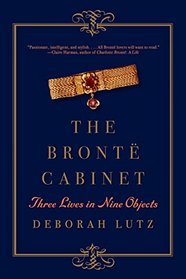Search -
The Brontė Cabinet: Three Lives in Nine Objects
The Bront Cabinet Three Lives in Nine Objects
Author:
An intimate portrait of the lives and writings of the Brontė sisters, drawn from the objects they possessed.In this unique and lovingly detailed biography of a literary family that has enthralled readers for nearly two centuries, Victorian literature scholar Deborah Lutz illuminates the complex and fascinating lives of the Brontės through the th... more »
Author:
An intimate portrait of the lives and writings of the Brontė sisters, drawn from the objects they possessed.In this unique and lovingly detailed biography of a literary family that has enthralled readers for nearly two centuries, Victorian literature scholar Deborah Lutz illuminates the complex and fascinating lives of the Brontės through the th... more »
ISBN-13: 9780393352702
ISBN-10: 0393352706
Publication Date: 4/4/2016
Pages: 336
Edition: 1
Rating: ?
ISBN-10: 0393352706
Publication Date: 4/4/2016
Pages: 336
Edition: 1
Rating: ?
0 stars, based on 0 rating
Publisher: W. W. Norton & Company
Book Type: Paperback
Other Versions: Hardcover
Members Wishing: 2
Reviews: Amazon | Write a Review
Book Type: Paperback
Other Versions: Hardcover
Members Wishing: 2
Reviews: Amazon | Write a Review
Genres:
- Biographies & Memoirs >> Arts & Literature >> Authors
- Biographies & Memoirs >> Specific Groups >> Women
- Literature & Fiction >> History & Criticism >> Women Authors
- Nonfiction >> Women's Studies >> Women Writers




